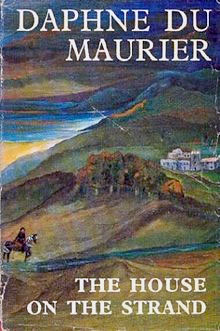 Strange book, and all the more reason to love Daphne du Maurier. She combines elements of time travel, historical fiction and gothic literature, all the while writing about her own home.
Strange book, and all the more reason to love Daphne du Maurier. She combines elements of time travel, historical fiction and gothic literature, all the while writing about her own home.
The story begins with Dick Young, the first-person narrator, who has left his job with a publishing firm in London and travelled to Cornwall to stay at his friend Magnus’s home. Young has agreed to experiment with his friend’s concoction that promises a different sort of time travel than readers have experienced in any other sci-fi.
Professor Magnus Lane, a chemical researcher, developed a brew that allows Young’s mind to travel in time, while his body remains in the present. Young has been cautioned that he must not touch anyone while he’s time-travelling, which brings about a violent return to the present. He also discovers the brew is addictive.
Young wanders through various parts of Cornwall near Magnus’s home in order to time-travel to the fourteenth-century story that unfolds.
The present-day story involves Young’s marriage to Vita, who came to the marriage with two children, boys. The marriage isn’t the least bit romantic and Young, for the most part, steps around his wife and stepsons so he can venture into the time-travel to the fourteenth century.
Place matters, as it does in all of du Maurier’s books I’ve read so far. I like that the fourteenth century story is not romanticized; in fact it’s rather grim.
There are so many surprises in the book, I’m not sure what some reviewers mean when the talk about a surprise plot twist. It is one twisted plot all the way through!
I worried much more about the present-day story than the one that unfolds in the fourteenth century.
In Rebecca, du Maurier’s theme of place reminds us again and again that place holds memories of people who have passed by. The narrator thinks about Rebecca, who has danced in the great hall of Manderley, imagining the little whiffs of perfume that have trailed her and still remain hidden in the atmosphere. The narrator sees traces of Rebecca, moment by moment, in the food she eats, the morning room she sits in, the interactions with servants at Manderley, and of course, in every conversation with Mrs. Danvers.
In The House on the Strand, the theme of place reminds us of time, which is woven like strands of fiber into place. When Dick Young has taken his drops he experiences the strand of time that unraveled during the fourteenth century.
I’m glad I read this book, but I missed the more youthful, exuberant descriptions of place I’ve read in du Maurier’s earlier novels . In Frenchman’s Creek, du Maurier rhapsodizes about birds, winds, the sea, ribbons of sunset, and you feel you are breathing the very air of Cornwall as you read. In The House on the Strand, I held my breath throughout most of the descriptions.